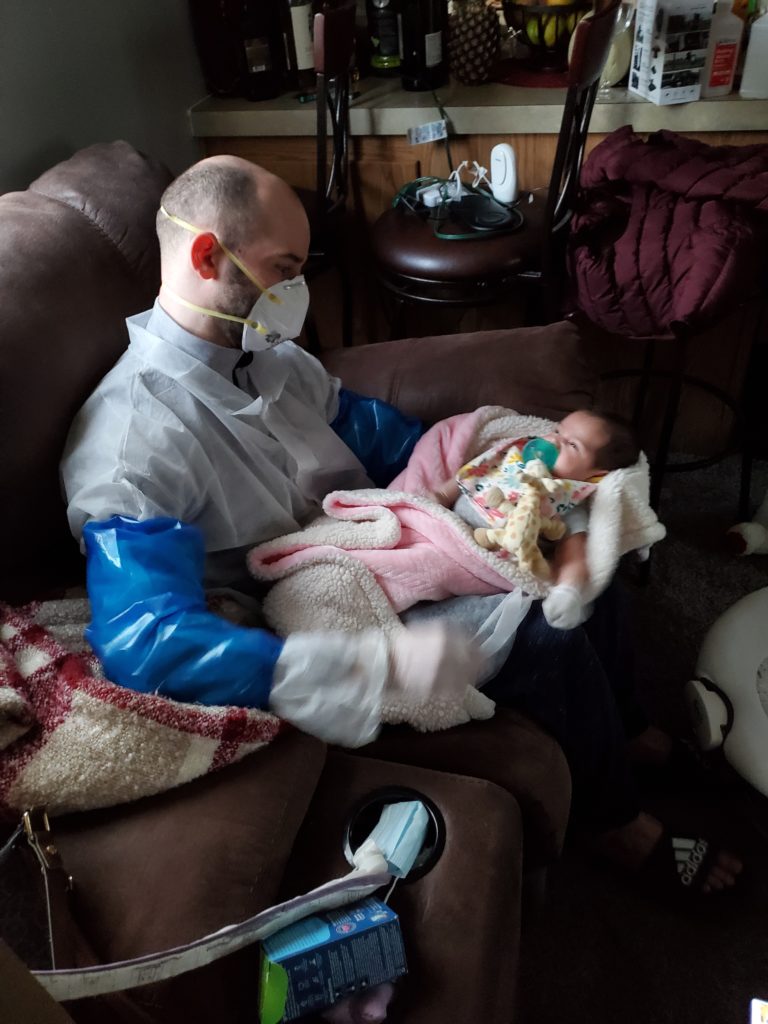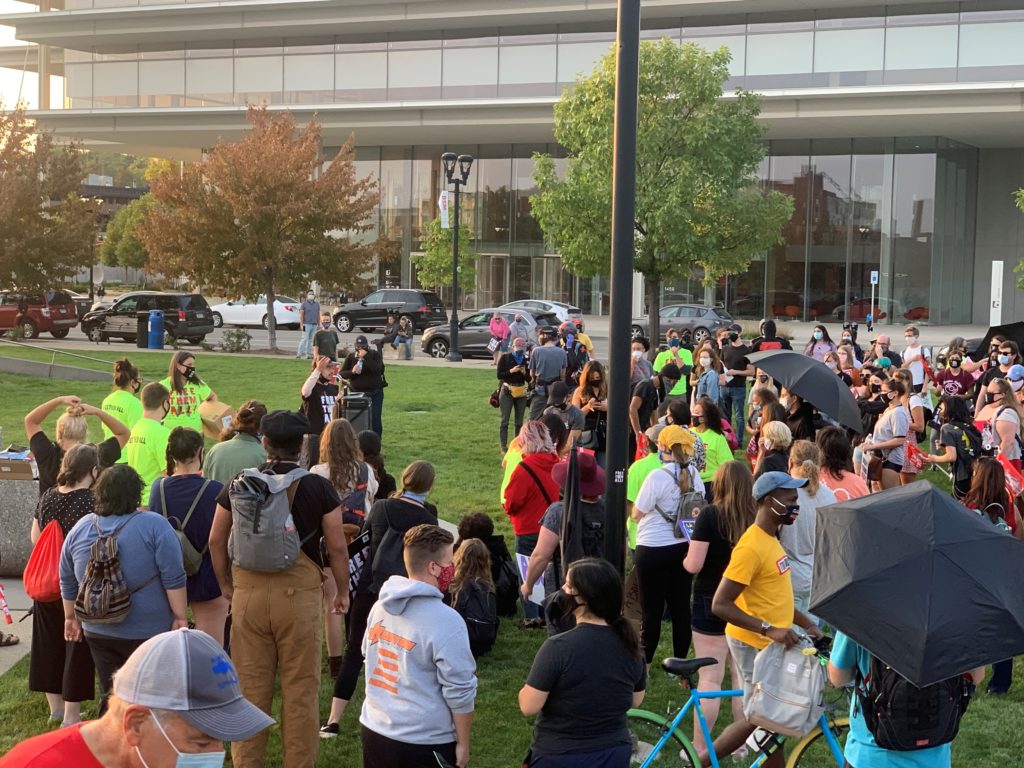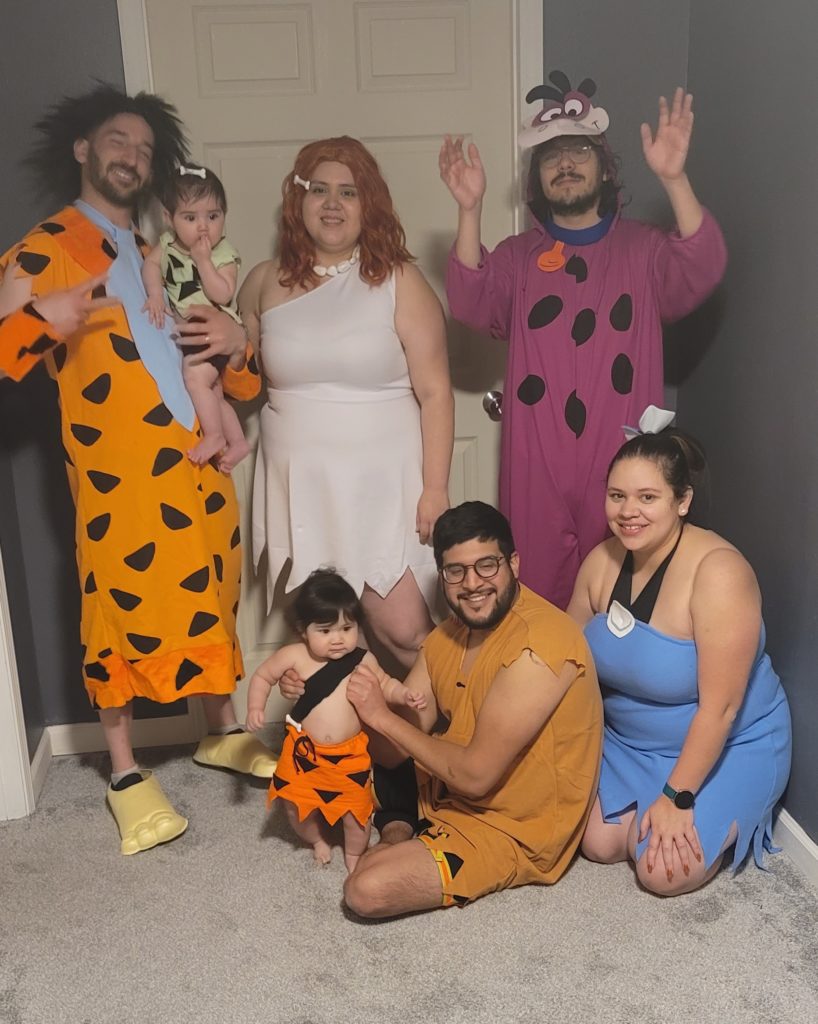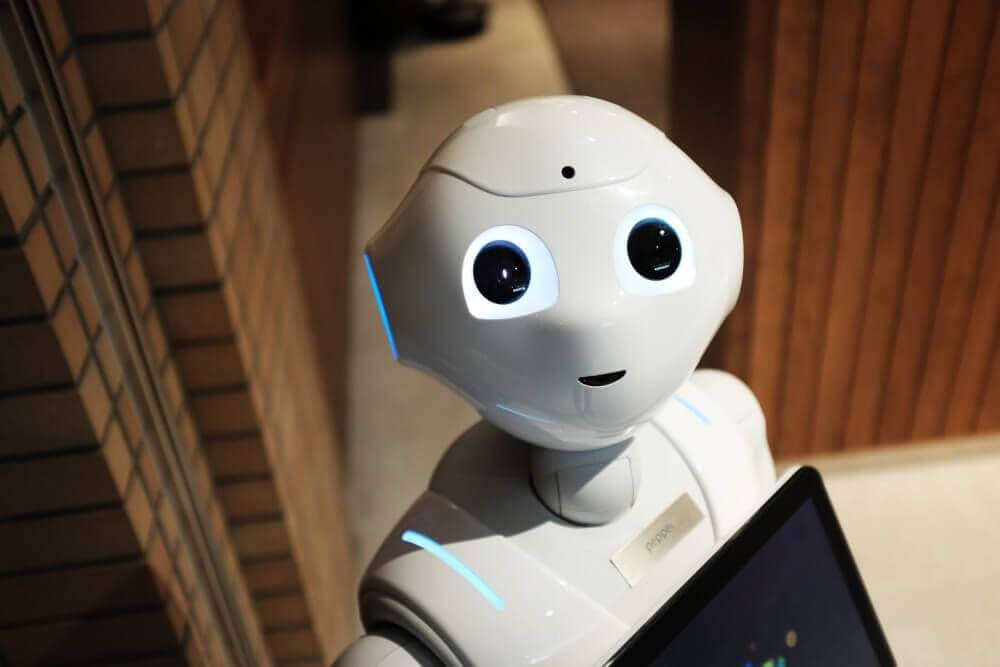DES MOINES, Iowa — Isabel Djaroun stood with her mother in the living room in her home in Sioux City. Isabel’s one-month-old daughter Nadia sat in her purple and white baby swing nearby. The two older women leaned over a giant silver-plated pot that’s usually reserved for pozole, a kind of Mexican stew.
Isabel and Micaela Ortiz held a brown blanket over their heads. It was Isabel’s first marital comforter, but it was the largest piece of fabric they owned, and it worked perfectly to make a sauna over the large pot. And instead of stew, the giant pot held an old family recipe of spices and herbs to help clear out their lungs. Occasionally Isabel would stir the steaming hot concoction with a wooden spoon. That spoon still gives her flashback to this day.
The three generations of women had been exposed to COVID-19. And the makeshift sauna provided some relief, just enough to be able to breathe easy.
Isabel believes her husband Massi initially brought home the virus from a meatpacking facility in Dakota City, Nebraska where he works as a translator. It also could also have been her brother-in-law, who was also putting in long hours at the same plant. Or, come to think of it, it could have been her mother who worked at a different meatpacking plant in Sioux City.
What Isabel knows for sure is that all the adults in her home tested positive. She had been home on maternity leave when one day, Massi walked in the door complaining of a few symptoms. He could no longer smell the aromas of Mexican cooking from the kitchen. Oddly, he couldn’t taste the spicy chili Isabel had packed him for lunch that day.
Isabel knew that was a symptom of the virus that had already killed a number of her friends, clients and their loved ones. And she did the only thing she could do. She took a COVID test that week.
And waited for two days.
When her phone rang, it was the urgent care notifying that she had tested positive for COVID-19.
To her, it felt like a tidal wave had hit the family. Isabel quarantined herself in her room. Her mother took care of baby Nadia. Her father Martín was in the hospital with pneumonia. And she couldn’t do anything.
Isabel wrung her hands, alone in her room, while her newborn cried just on the other side of the wall. The closed door silently mocked her. It was so easy to open, but if she did, she would be putting her daughter at risk.
All the worrying was taking a toll. She felt her throat was closing. As her family called the hospital to let them know a COVID patient was on the way, images of Nadia growing up without a mother flooded Isabel’s mind.
***
Isabel learned at the hospital that she had suffered from a severe anxiety attack. She thanked God it wasn’t caused by COVID-19.
Isbel’s eyes welled up as she recalled the memories, tears fell down her cheeks and on to her long brown hair. She still struggles with anxiety— for her, that’s one of the underlying, long-term conditions of surviving COVID-19.
While COVID made its way from Isabel’s husband, to herself, to Micaela, the family relied on the other three siblings to run errands, bring them medicine and distract them from the fact that they had a disease that had killed thousands in the state, and in their community. Many of its victims had been immigrants and meatpacking workers.

Meatpacking facilities in Iowa saw some of the worst outbreaks of COVID-19 in the state. The federal government declared meat plants among essential facilities that needed to stay open. The “flyover” state started gaining national attention when plants started shutting down after too many of their employees were infected. Meatpacking facilities in the state were among those included in a federal investigation into coronavirus outbreaks in such facilities.
Hundreds of meatpacking workers have died from the disease and tens of thousands have tested positive, according to the Food & Environment Reporting Network. Most of the cases are heavily concentrated across Iowa, Nebraska and South Dakota. Most of the positive cases and deaths among meatpacking workers in Iowa was at Tyson Foods. That’s where Martín worked. (He has since stopped working and is on long-term disability leave.)
Micaela works at the Smithfield plant in Sioux City. Several of the company’s other plants shut down temporarily amid COVID-19 hotspot designations. Smithfield also faced OSHA violations and earlier this year, reached a settlement with the federal government to change a number of health procedures relating to infectious diseases.
***
As they dealt with COVID-19 infections, the family relied heavily on the youngest Ortiz, Alejandro.
At 25 years old, Alejandro Murguia-Ortiz felt like he was balancing the world on his shoulders. Knowing that he was his family’s “only option,” Alejandro drove the almost three hours from Des Moines to Sioux City to care for his dad while everyone else was quarantined with COVID in Isabel’s home. He remembers waving to his mom from the front window of the little blue home. Her from the inside and him from the outside with a sheet of glass in between for protection.
One night, Alejandro remembers crying, under the immense stress and worry about his family. His mother, who is studying for her citizenship exam, didn’t go to the doctor because she felt the health system is too complicated for people who aren’t U.S. citizens.
Even ordering food seemed too much, as the bills from hospital care for Martín piled up.
And his family was just one of the cases Alejandro had taken on. He had just started a new job as a community organizer for a nonprofit that helps immigrants and other underserved communities in Iowa. So when he cried, the tears weren’t just for his family, but also for the families dealing with immigration agents, the families whose loved ones died, the families struggling financially.
Alejandro’s shoulders fall as he remembers the utter exhaustion that took over him.

Martin knew it wasn’t easy for his youngest son, but Alejandro taking on more responsibilities didn’t surprise him.
Growing up in Jalisco, in Mexico, it was always work, work, work.
After a short hesitation, Martin adds “and school.”
Life wasn’t much different for Micaela, who is also from the west coast Mexican state of Jalisco. Although she didn’t go to school after fourth grade, Micaela remembers a childhood that was beautiful. She and her siblings didn’t always get what they wanted, Micaela recalled, but she got what she needed.
And they both remember Alejandro as not the one to give up easily, even as a child. One time, Micaela remembers, Alejandro was riding his bike. He loved playing outdoors. But, he and his siblings weren’t supposed to get too far from the house. This time, he rode his bike too far away.
He fell and hurt his knee. He cried for a bit, but then he got up, and got back on the bike. And, he never stopped riding his bike.
Another time, Micaela says, he was jumping on the trampoline and fell off. He broke his hand. He still loves jumping on the trampoline today.
***

As time passed and his family healed physically from the virus, Alejandro began focusing on vaccine outreach and making sure his community members had access to COVID information, in a language they understand. Most times, he said the state’s outreach was severely lacking.
For the first few months of COVID-19, Iowa Gov. Kim Reynolds didn’t have Spanish interpreters for her weekly press conferences. When the vaccine was introduced, meatpacking workers weren’t considered in “tier one” in the rollout. And in almost all counties, some workers were excluded from pandemic relief funding due to their immigration status. (Johnson County recently agreed to using some of their American Rescue Plan Act funds for these excluded workers.)
When vaccines were available to workers, meatpacking plants organized vaccination clinics. But some people didn’t sign up. Tyson Foods ended up returning vaccines to local health departments. The Tyson Foods Perry plant in Dallas County, Iowa returned enough to double the county’s vaccinations one week, a spokesperson for the county health department said.
“I think much of that is just because of the trust that has been lost in trying to get adequate information,” Alejandro said. “I think people are seeing, you know, our structures or systems for what they truly are. And that they are oppressive and that they exist to be that way in many cases.”
For Micaela, his mom, it was the isolation that she remembers as being the worst part of getting COVID-19. Despite being hospitalized, Martín felt the same way.
But Isabel remembers it differently. As her parents spoke, her eyes widened and she gripped the armrest of her lazy boy chair. She shook her head almost imperceptibly. The soft yellow light of the room glinted off her glasses.
“I was kind of getting really annoyed when my parents were getting interviewed, especially with my dad,” she admitted. “They both were treating it like, ‘oh, it was not hard, no big deal.’ But it was hard! Super super hard.”
They can all agree though, Alejandro, Isabel, their siblings and parents, that somehow, they came out the other side stronger. They visit each other more often. They laugh together more often.
Alejandro chuckles as he remembers the video conference calls between family members during the separation. They used Facebook Messenger, which allows users to digitally change their faces. So when they talked about how bad COVID was getting and how they would keep hospital bills low, it was a conversation among a concerned crocodile, rainbow-cheeked fashion mogul and shiny-auraed unicorn.
Alejandro and Isabel see their parents in a new light. They’re not invincible. But that’s what makes them human.
They realized they can take their fate in their own hands and take care of one another across the three generations of their family.
A few weeks ago, Alejandro retweeted a post from his job about worker strikes at Smithfield and John Deere factories. He included the comment “proud of my mom for walking out of her job in solidarity with her coworkers even though she’s set to retire in a few months!!”
Isabel was also proud. She says it’s because her mom is finally showing people the reason why the Ortiz children are so strong. They learned it from their mom and their family.
“And it’s because at the end of the day, communities will come together to solve the issues that leadership aren’t going to solve, or at least to do what we can,” Alejandro said.
Richard Tedeschi, a clinical psychologist at the University of North Carolina at Charlotte, has studied families and individuals that have shown the same reactions as the Ortiz family after a traumatic event. Tedeschi said traumatic events can be anything from severe isolation to contracting deadly viruses during a time of high economic stress.
Tedeschi found some people respond to trauma in a positive way, exhibiting a sense of post-traumatic growth, a term he and a colleague coined in 1995. It means a traumatic event has caused a positive change in a person’s life. And one thing Tedeschi found to be integral to an individual experiencing post-traumatic growth is the existence of an expert companion. This can be anyone who listens and offers empathy to the person going through a traumatic event — like a group of family members.
On the cover of one of his most recent books, Transformed by Trauma: Stories of Posttraumatic Growth, there’s a blue pot. There are gold seams trailing up and around the pot, holding together its broken pieces. It’s showing the Japanese art of Kintsugi pottery.
“[It’s] the underlying philosophy that what is broken can be put together in a more beautiful form, Tedeschi explained. “And that’s sort of what we’re talking about with people here, and people’s lives. Their lives have been broken up in some way. But then pieced back together in a way that’s different, obviously different, but has greater beauty to it.”

It wasn’t an easy journey, but now everyone in the Ortiz family is now vaccinated, except for baby Nadia, who is too young. Isabel says one day she’ll tell her young daughter about her first year on earth, and how important family is in overcoming life’s challenges.
Vaccines are widely available and Tyson Foods says nearly all of its employees have gotten vaccinated, but that doesn’t mean Alejandro’s job has gotten any easier.
Almost every day, Alejandro makes and receives calls about other injustices still present in Iowa. At times, he admits he has to shut off his phone to have time to breathe. But he’s found a way to have balance in his life.
His latest project is running for Iowa State Senate in District 17.
“One of the biggest things that I learned about leadership is that, if you’re a leader, but you’re making top-down decisions, you’re not actually going to address the needs. You’re just going to try to put a Band-Aid on something. If you’re a leader, and you’re not having conversations with people and you’re not letting that guide the work that you’re doing, then you’re not actually a leader,” he said.
At a letter-to-the-editor training, Alejandro gave his “students” pointers on what to include in letters to get people’s attention. His last piece of advice before ending the hour-long session: If you care, other people probably do too. They just haven’t spoken up yet.
Editor’s note: *Micaela and Martín’s interviews were translated from Spanish
Kassidy Arena is a Report for America corps member covering the Latino and Spanish-speaking community in the state for Iowa Public Radio.
The post Through the trauma of getting COVID-19, this family of Iowa meatpackers found strength appeared first on The GroundTruth Project.
from The GroundTruth Project https://ift.tt/3FOjJdM
https://ift.tt/3FMDZwo












No comments:
Post a Comment